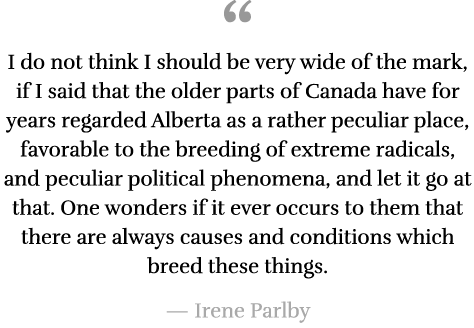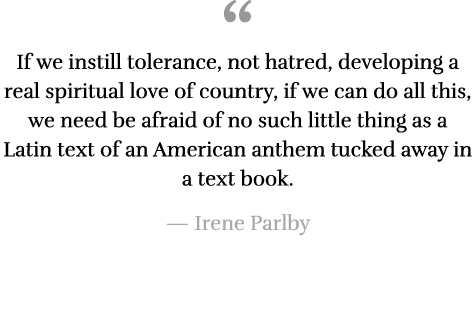Irene Parlby, an advocate for rural women and children, was elected to the Alberta Legislature in 1921. She was appointed Minister without Portfolio—the first female Cabinet Minister in Alberta history and only the second in the British Empire.
Irene represented Canada at the League of Nations in Geneva in 1930 and was the first woman awarded an honorary doctorate from the University of Alberta in 1935.
Irene joined her fellow suffragists, Nellie McClung, Emily Murphy, Henrietta Muir Edwards, and Louise McKinney in the victorious fight to give women the right to run and vote for office. She also petitioned successfully for improved health care facilities, better educational opportunities and protection for widows and children.
An early supporter of the United Farmers of Alberta (UFA), she helped form the first women's local in 1913, and was elected president of the Women's Auxiliary in 1916. She transformed it into the United Farm Women's Association (UFWA), an organization which played a major role in fostering legislation related to the welfare of women and children. As the organization's first president she saw the need for changes to improve the social and political status of women. In 1916 Irene was a delegate to the joint United Farmers of Alberta and United Farm Women's Association convention in Calgary and presented a paper entitled: "Women's Place in the Nation." In this paper she argued that women should be taking a much more extensive role in different aspects of society. Some say that when she was telephoned from the UFA nominating convention in 1921, asking that she stand as a provincial candidate for the Lacombe constituency, she refused. "But," she was urged, "you have been advocating that women take a larger place in public affairs." Irene accepted the nomination.
Irene never liked political campaigns. She could stand before an audience and deliver a clear and convincing speech and she was good at rebuttal. But she was never at ease when faced with rough argument or rude heckling. She remembered the 1921 provincial campaign as having been "nasty," with much abuse against herself. "The only thing which seemed to concern my opponents," she said; "was that I am a woman—and worse, an Englishwoman who, although I came to western Canada when it was still an undeveloped wilderness, could not possibly know anything about it!" Despite these declarations concerning her unsuitability for the legislature, Irene was elected. "The farmers put me in," she said.
The people of Alberta also elected thirty-nine other United Farmers of Alberta candidates. The provincial legislature at this time had sixty-one seats, and this gave their party majority power. In the UFA government of 1921-1935, first under Premier Herbert Greenfield, then Premier J.E. Brownlee, Irene was Minister without Portfolio. At the time of her appointment, only one other woman—Mary Ellen Smith of British Columbia—had ever held cabinet rank within the British Empire. Irene represented Lacombe for 14 years. Minister Parlby established traveling medical clinics and advocated for the principle of distance education. She successfully sponsored the Minimum Wage for Women Act (1925) and spent her life supporting initiatives to improve the lives of women and children, especially through the “Persons” Case.
Irene's work as a politician earned her first provincial, then national, and eventually international respect. Some people called her the "Minister of Cooperation." This title recognized her ability to work cooperatively with others to benefit all people. In 1928 Irene gave a speech, "What Business Have Women in Politics?" In it she voiced her conviction that women were needed in politics. She believed in learning by doing. She said that by entering politics, women would learn politics. In recognition of her years of service on the Board of Governors at the University of Alberta, this nation builder was also granted an honorary law degree.
Despite her success and the respect of her peers, Irene did not enjoy her political involvement. Her motivation was a strong sense of duty. Before she retired from politics in 1935, Irene served her adopted country internationally when Prime Minister R.B. Bennett made Irene a Canadian delegate to the League of Nations, the forerunner to the United Nations.
After her retirement, Irene continued to live where she and Walter Parlby had originally settled. The woman whose reluctant efforts contributed so much to Alberta's early days, died at the age of 97 on July 12, 1965, on the ranch she and her husband had built many years before. Her gravestone reads: "Irene Parlby, LLD."



